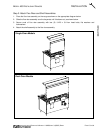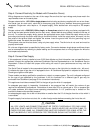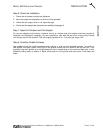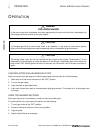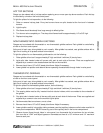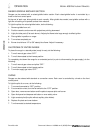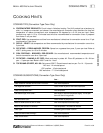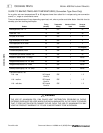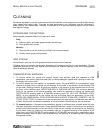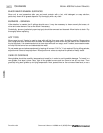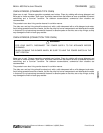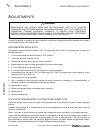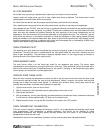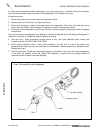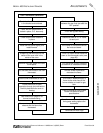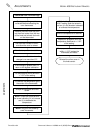
MODEL 400 RESTAURANT RANGES CLEANING
OPERATOR’S MANUAL 1182299 REV 3 (05/05) DRAFT PAGE 23 OF 64
CLEANING
CLEANING
Southbend equipment is sturdily constructed of the best materials and is designed to provide durable service
when treated with ordinary care. To expect the best performance, your equipment must be maintained in
good condition and cleaned daily. Naturally, the periods for this care and cleaning depend on the amount
and degree of usage.
EXTERIOR AND TOP SECTIONS:
Keep exposed, cleanable areas of unit clean at all times.
Daily:
A. Remove, empty, and clean grease drawers and dirt trays.
B. Clean griddle drain chutes.
Monthly:
A. Clean around burner air mixers and orifices if lint has accumulated.
B. Visually assure proper pilot operation.
VENT SYSTEM
At least twice a year the unit venting system should be examined and cleaned.
Following daily and periodic maintenance procedures will enhance long life for your equipment. Climatic
conditions (such as salt air) may require more thorough and frequent cleaning or the life of the equipment
could be adversely affected.
STAINLESS STEEL SURFACES
1. To remove normal dirt, grease and product residue from stainless steel that operates at LOW
temperature, use ordinary soap and water (with or without detergent) applied with a sponge or cloth. Dry
thoroughly with a clean cloth.
2. To remove grease and food splatter, or condensed vapors, that have BAKED on the equipment, apply
cleanser to a damp cloth or sponge and rub cleanser on the metal in the direction of the polishing lines
on the metal. Rubbing cleanser, as gently as possible, in the direction of the polished lines will not mar
the finish of the stainless steel. NEVER RUB WITH A CIRCULAR MOTION. Soil and burnt deposits
which do not respond to the above procedure can usually be removed by rubbing the surface with
SCOTCH-BRITE scouring pads or STAINLESS scouring pads. DO NOT USE ORDINARY STEEL
WOOL, as any particles left on the surface will rust and further spoil the appearance of the finish.
NEVER USE A WIRE BRUSH, STEEL SCOURING PADS (EXCEPT STAINLESS), SCRAPER, FILE OR
OTHER STEEL TOOLS. Surfaces which are marred collect dirt more rapidly and become more difficult
to clean. Marring also increases the possibility of corrosive attack. Refinishing may then be required.
3. To remove heat tint – Darkened areas sometimes appear on stainless steel surfaces where the area
has been subjected to excessive heat. These darkened areas are caused by thickening of the protective
surface of the stainless steel and are not harmful. Heat tint can normally be removed by the foregoing,
but tint which does not respond to this procedure calls for a vigorous scouring in the direction of the
polish lines, using SCOTCH-BRITE scouring pads or a STAINLESS scouring pad in combination with a
powered cleanser. Heat tint action may be lessened by not applying, or by reducing heat to equipment
during slack periods.



